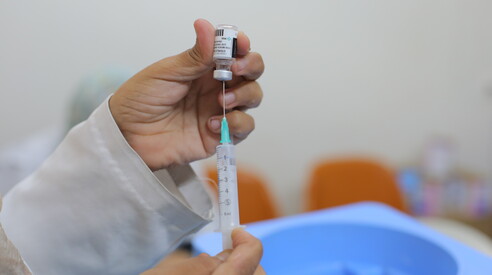The issue is not to abolish the vaccination obligation, but to do it for mere ideology


Getty Images
the real no vax issue
The League relaunches the proposal to abolish the Lorenzin law, the government is divided. But the problem is the misleading narrative that calls into question the safety and efficacy of vaccines: without an efficient surveillance system and a shared culture of prevention, removing the requirement risks opening the door to new health emergencies.
On the same topic:
In recent days, the debate over mandatory pediatric vaccinations has reopened, with the League party once again calling for the abolition of the Lorenzin law , passed in 2017, which introduced mandatory vaccination for school attendance. Senator Claudio Borghi has championed this proposal , announcing new amendments to repeal the law . However, this position has not found full support within the majority: Prime Minister Giorgia Meloni, while not openly opposing it, has put the brakes on the initiative , and even within the Brothers of Italy party, a certain ambiguity has emerged, with a fringe group supporting the idea but lacking a clear, shared position. Beyond current political developments, it's worth asking a deeper question: is mandatory vaccination truly untouchable? Actually, no. It is, as often happens in public healthcare, a political choice. A decision that can be introduced or removed, depending on the social, health, and cultural context. But the key issue today is not whether or not to abolish the requirement, but how and why it is being abolished.
In Italy, those who advocate ending mandatory vaccinations often do so by fueling a misleading narrative that calls into question the safety and efficacy of vaccines. This is a dangerous rhetorical strategy that undermines trust in science and healthcare institutions. And it is precisely this narrative that poses the real problem. Because, as several Northern European countries demonstrate, it is possible to achieve high vaccination coverage even without legal requirements.
In the Scandinavian countries—Sweden, Finland, Norway, Denmark, and Iceland—pediatric vaccination is not mandatory. Yet, coverage rates are among the highest in Europe. In Sweden, for example, 97.5 percent of children regularly receive the measles, mumps, and rubella vaccine. In Finland, coverage exceeds 95 percent for almost all recommended vaccines. Denmark and Norway also maintain rates above 90 percent, with peaks of 98 percent for some primary vaccinations. These results are not the result of chance: they derive from an efficient, accessible, and widespread healthcare system. But above all, from a climate of mutual trust between citizens and institutions, in which accurate information is the basis of individual and collective decisions. The point is precisely this: in countries where a culture of prevention based on awareness, not on imposition, much less on a culture of suspicion and permanent conspiracy, mandatory vaccination becomes superfluous. But this balance is fragile and cannot be replicated simply by repealing a law. It is necessary to create the conditions for the population to continue to vaccinate voluntarily, with the certainty that it is an act of protection for themselves and the community.
In Italy, however, these conditions do not exist today. Before even discussing the abolition of mandatory vaccination, we should establish a true national and regional vaccination registry, capable of monitoring vaccination coverage in real time and flagging any critical issues. Without this tool, it is impossible to intervene promptly in the event of a decline in vaccination rates. Yet, those who are now insistently calling for the abolition of mandatory vaccinations appear to have no interest in providing the country with an efficient surveillance system. Indeed, their attention is almost exclusively focused on an anti-vaccine campaign, disguised as a battle for freedom of choice. In conclusion, mandatory vaccinations can certainly be discussed, even with the goal of one day eliminating them. But it cannot be an ideological choice, much less a pretext to delegitimize science and destabilize public healthcare. If abolition is accompanied by a toxic narrative that fuels mistrust and fear, then a decline in vaccinations becomes inevitable. And with it, the risks to children's health, to the viability of the National Health Service, and to the entire community increase.
More on these topics:
ilmanifesto





